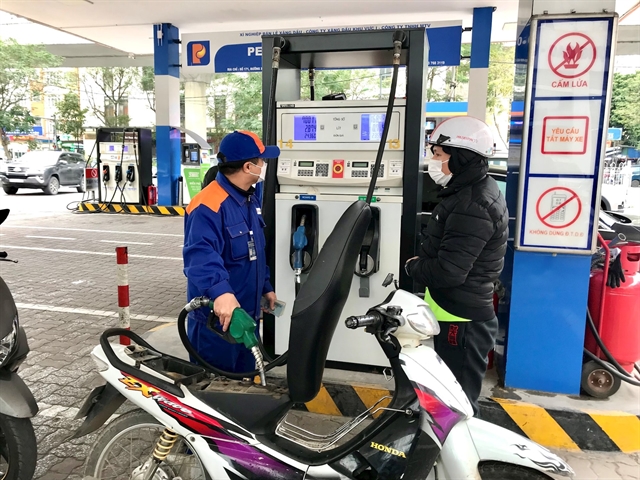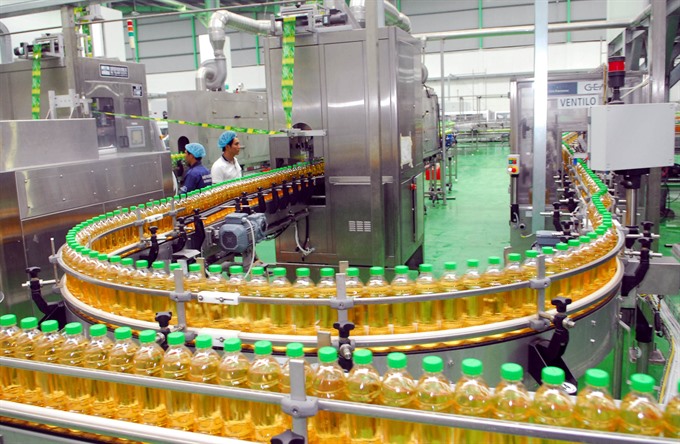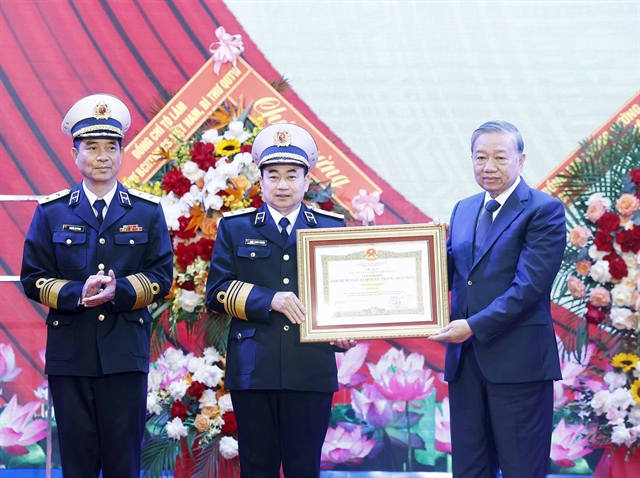 Economy
Economy

" />The fourth industrial revolution is giving rise to “smart” factories where robotics, artificial intelligence (AI), cloud computing, and data analytics are used to link production and logistics processes and make manufacturing more intelligent, efficient and sustainable, but their number is limited in Việt Nam.
 |
| Bottled drinking water production line of Number One Hà Nam Co. Ltd’s beverage factory in northern Hà Nam Province, using 4.0 technology to ensure high hygiene and safety standards. — VNA/VNS Photo Danh Lam |
Gia Lộc
HCM CITY— The fourth industrial revolution is giving rise to “smart” factories where robotics, artificial intelligence (AI), cloud computing, and data analytics are used to link production and logistics processes and make manufacturing more intelligent, efficient and sustainable, but their number is limited in Việt Nam.
Nguyễn Văn Phi Vân, technical key account director of Tetra Pak Vietnam Joint Stock Company, said: “The fourth industrial revolution brings potential value to resolve challenges which manufacturers of beverages and foods have faced.”
The challenges include consumers’ increasing demand for food safety and hygiene and traceability, while manufacturers want to improve productivity and cut costs, he said.
Industry 4.0 marked by the Internet of Things, big data, artificial intelligence, and others helps companies increase productivity.
“Thanks to a continuous process of automation ushered in by the fourth industrial revolution, companies can reduce costs.
“Industry 4.0 optimises logistics to create an efficient supply chain and distribution channels and makes businesses respond more quickly to the changing demands of their customers, embrace new ways of working and partner with their employees to create new jobs through the upskilling of their workforce.”
Industry 4.0’s applications help companies ensure full traceability from raw material to consumer, he said.
They also provide predictive maintenance, he added.
Ronaldo Villanueva, IT head of URC Vietnam, said that his company is benefiting from industry 4.0, which it applies in its factories in Việt Nam.
The food and beverage company is a subsidiary of URC Group Philippines and came to Việt Nam in 2003.
Villanueva said: “We have started preparing our factory lines with robots and automated racking systems. We are going to implement SAP manufacturing intelligence and integration and manufacturing execution systems to link our factory equipment with our backend systems starting this year.”
The company believes that automation of factories using new technologies would enhance and streamline their operations, enable real-time performance monitoring and analysis and improve quality and availability of raw materials, he said.
“Our company will definitely benefit by reducing the cost to produce and be able to make our product available to consumers at a faster speed.”
Gaku Echizenya, CEO of Navigos Group said: “International companies quickly update technologies, so Vietnamese companies should speed up in the technological race to write the name of Việt Nam on technological maps.
“Besides, we should create more forums for the tech community for exchanging, learning, practising new technologies. To lessen the danger of tech brain drain, we should also focus on talent retention, create good conditions for innovating products and chances to come in contact with new technologies.”
His company’s latest survey of 1,100 workers in IT/ technology found that a quarter of their firms already have plans for AI or blockchain in the next three years, he added.
Not many
Some innovative technologies like AI and blockchain have been used by some companies. Nine per cent of respondents said their companies already use blockchain while it was 19 per cent for AI.
Thirty nine per cent said combining AI and big data would help analyse data and arrive at better solutions.
AI will create smart machines to push industry towards full automation and smart robots which will help humans do dangerous tasks.
Blockchain will help create apps to verify the quality of products, contracting and payment.
Big companies will adopt blockchain in their operations, technology eco-system or working process to improve authentication and trust.
According to another survey conducted late last year by the Ministry of Industry and Trade, 82 per cent of Vietnamese businesses were not prepared for the fourth industrial revolution with only 10 per cent saying they were ready.
The head of the Party Central Committee’s Economic Commission, Nguyễn Văn Bình, told Việt Nam News Agency that the country is studying and making legal policies to create favourable conditions for enterprises and people to learn about and apply technology.
At a high-level forum on industry 4.0 held last July Prime Minister Nguyễn Xuân Phúc instructed the Ministry of Planning and Investment to soon complete the National Strategy on the Fourth Industrial Revolution.
He also ordered the Ministry of Science and Technology to make the 2035 science and technology and innovation report and all ministries and localities to develop an action plan to embrace industry 4.0.—VNS




